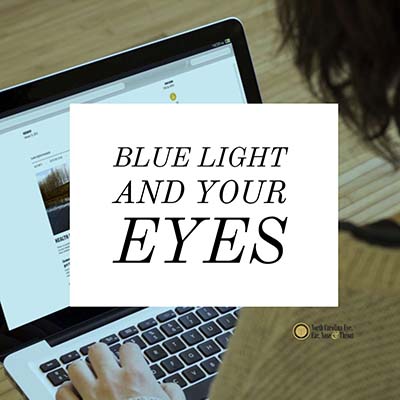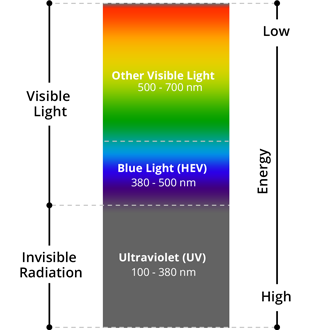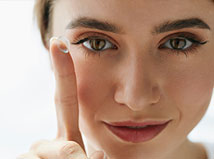Blue Light and Your Eyes

Are your eyes tired at the end of the day? Are you having trouble sleeping at night? These may be signs of Blue Light exposure.

What is blue light?
Blue light is part of the visible light spectrum. Without getting into complicated physics, there is an inverse relationship between the wavelength of light rays and the amount of energy they contain. Light rays that have long wavelengths contain less energy, and those with short wavelengths have more energy. Blue light has a very short wavelength, and so produces a higher amount of energy.
Where is blue light found?
Sunlight is the main source of blue light, and being outdoors during daylight is where most of us get most of our exposure to it. But there are also many man-made, indoor sources of blue light, including fluorescent and LED lighting and flat-screen televisions.
Computer screens, smartphones and other digital devices emit significant amounts of blue light.
How can blue light affect our eyes?
Blue light reaches deeper into the eye and its cumulative effect can cause damage to the retina. Furthermore, in certain wavelengths, blue light is implicated in the development of age-related macular degeneration (AMD).
How can blue light affect the body?
Blue light is very important in regulating circadian rhythm — the body's natural wakefulness and sleep cycle. Exposure to blue light during daytime hours helps maintain a healthful circadian rhythm. But too much blue light late at night (ie: browsing social media on your phone or reading a on a tablet or e-reader at bedtime) can disrupt this cycle, potentially causing sleepless nights and daytime fatigue.
How can you protect your eyes?
Routine eye examinations are recommended for all ages to look for AMD. Sunglasses protects your eyes against both UV rays and the blue light spectrum. Ask your NCEENT eye doctor at your next appointment or stop in our Optical Centers in Cary, Chapel Hill and North Durham today to find out which type of vision correction and lens features best suit your needs for viewing computers and other digital devices.
Hillary Dolan, OD is an optometrist who specializes comprehensive optometry, specialty and medically necessary contact lens fitting and the diagnosis and treatment of dry eye. Dr. Dolan sees patients in our Cary and North Durham Offices. Schedule an appointment here or call 919-595-2000 today.
By Hillary Dolan, OD



